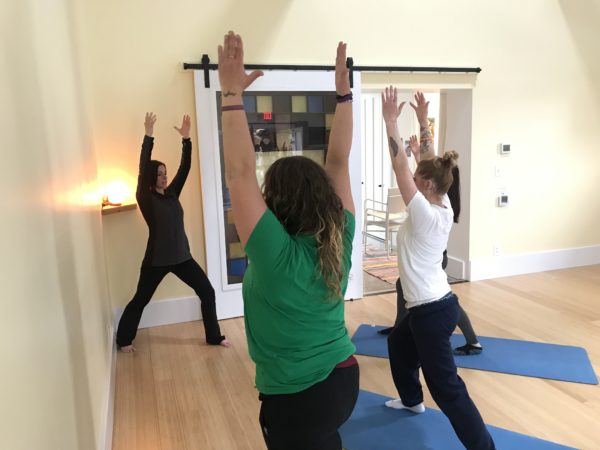 Picture in your mind a five year old girl falling off her bike, crashing to the ground, and catching herself on the pavement with what are now bleeding hands and skinned knees. If her mother comes quickly to her side, provides reassurance with a caring and concerned tone, and cleans and bandages her injury, she is more easily able to calm down, trust that she is okay, and know that when she needs help her mother will be there.
Picture in your mind a five year old girl falling off her bike, crashing to the ground, and catching herself on the pavement with what are now bleeding hands and skinned knees. If her mother comes quickly to her side, provides reassurance with a caring and concerned tone, and cleans and bandages her injury, she is more easily able to calm down, trust that she is okay, and know that when she needs help her mother will be there.
However, if her mother was nowhere to be seen when this happened and then blamed and criticized her for being clumsy, now the greater feeling of pain comes not from her scrapes and bruises, but from feeling alone and uncared for. This is also often the case with trauma; the pain of the initial injury is compounded by feeling alone, and not understood. Connie Lawrence, certified psychodrama practitioner, trainer, and founder of the Cleveland Psychodrama Institute has stated, “When we suffer a trauma, we really have two wounds. The first is the trauma itself-the second is the feeling that no one understands. For many of us the second is much more painful.”

With May being Mental Health Month, I’d like to share why support and connection are essential to one’s well-being and an integral part of healing from mental health diagnoses and substance use disorders. This connection can come from many sources: family, friendships, relationships with supportive peers, treatment providers, and community organizations. According to SAHMSA (The Substance Abuse and Mental Health Services Administration), relationships and social networks that provide support, friendship, love, and hope are major keys in supporting a life in recovery. Additionally, research has shown that when family or couples therapy is a part of treatment, results are clearly superior to modalities that do not include families, and family therapy promotes engagement and retention of clients.
“Even if our stories are different, broken, bruised and skinned hearts recognize each other”
Many of the clients I see are women who have a history of trauma, a pattern of unhealthy or abusive relationships, and often substance use. I lead a Women’s Empowerment group that aims to help women improve their self-esteem, develop skills to have healthy relationships, and a greater ability to trust others, as well as themselves. Women are able to summon the courage to share deeply about life experiences and look in the eyes of another woman who is saying, “I know how that feels” or “I’ve done that too.” Many times I have heard women in this group say something such as “This group has helped me to realize that I’m not alone” and “I used to hate other women. I never thought I could like having relationships with women.” A quote from research professor Brené Brown, PhD, MSW, states, “Even if our stories are different, broken, bruised and skinned hearts recognize each other, and when they come together they have the power to heal and create change.”
Connection to community organizations can also help to empower individuals with mental health and/or substance use issues and encourage growth. For many this may come from community support groups, 12- step programming, or involvement in a religious community. Catalyst’s Women’s Empowerment and Self-Care program, funded by The Richland County Foundation, is making it possible for women to engage in activities together in the community. Women in this program are participating in a series of classes including yoga, self-defense, healthy cooking, and creative workshops. This fosters connection through shared experiences and promotes social growth.
Women are exceptionally relationship-oriented, often defining themselves by important relationship roles: mother, daughter, sister, girlfriend, wife, etc. Consequently, women are vulnerable to trauma when an important relationship is severed and may resort to using substances or engaging in negative behaviors in order to numb emotional pain or connect with another person. In her article Psychodrama and the Treatment of Addiction and Trauma in Women, Tian Dayton states, “Treatment of women addicts needs to acknowledge and explore this desire to connect as healthy and natural and not to confuse it with codependency or an unhealthy desire to fuse with another person as a way of attaining a sense of self.” The key words here are “desire to connect.” This is not to say that all relationships (romantic or otherwise) are healthy. Trauma can form negative patterns in thinking, feeling, and behaving in relationships, that are often survival based, automatic, and very challenging to break. Nevertheless, it is important to learn that close relationships can be safe. This requires practicing new ways of relating while managing emotions.
Connection has always served an important role in survival. In today’s society, independence is revered and thought of as nearly synonymous with strength. It is important for individuals to be able to function independently, without excessive reliance on another to have needs met, however, our bodies and brains are still wired to connect and preserve relationships. Therefore, one’s desire for interdependence need not be pathologized. A healthy relationship has the ability to provide a sense of security, restore feelings of worth, and encourage growth.
It is much easier to get back on the bike when you know someone will be behind, steadying your seat, or even along for the journey riding tandem.
Guidelines for supporting a loved one with trauma and/or addiction
- Avoid comparing his/her experience to someone else or yourself. Everyone experiences trauma differently. Comparisons can feel invalidating. Many factors, such as one’s level of resiliency, support system, events that occur following the trauma, etc., contribute to how one is influenced by trauma.
- Be patient and respect boundaries. Traumatic events most often are periods of time in which one is powerless and does not have control. It is important now that trauma survivors (or anyone!) be able to make decisions for what is right for them and set boundaries. Respect that it may take time for a survivor to be more comfortable and trusting.
- Obtain information about diagnoses and how symptoms present for your loved one. Consider attending family counseling or relational counseling services with him/her in order to receive education and/or address how symptoms have influenced your relationship.
- Ask questions about how you may provide support when symptoms are observed as opposed to assuming what is needed.
- Focus on your self-care and needs. Be open to addressing your own mental health and/or substance use and how this relates to your loved one’s issues.
If this blog triggered difficult emotions, thoughts, or memories for you, know that you are not alone, and you may want to consider seeking professional support. Catalyst Life Services offers many services to address mental health, drug & alcohol, vocational, and many other issues.
Call Helpline at 419-522-HELP (419-522-4357) for information. We can help!

Audrey Wilson, LPC, MFT, provides couple’s and family therapy, as well as individual, and group counseling services. She started her career at Catalyst Life Services as a student intern. In 2016, she graduated with her Master’s in Marriage and Family Therapy from The University of Akron and was hired as a full-time therapist. Audrey facilitates The Family TREE (Treatment, Recovery, Education, and Empowerment), a support and therapy group she developed for the family and loved ones of individuals struggling with the disease of addiction. Additionally, Audrey leads The Women’s Empowerment group for women survivors of trauma. She serves as a court liaison through the Mansfield Municipal Court for clients participating in a diversion program. Audrey is a leader in the agency’s VOICE committee which aims to create a trauma-informed workplace. She has been a member of AAMFT since 2013 and is a PreClinical Fellow.